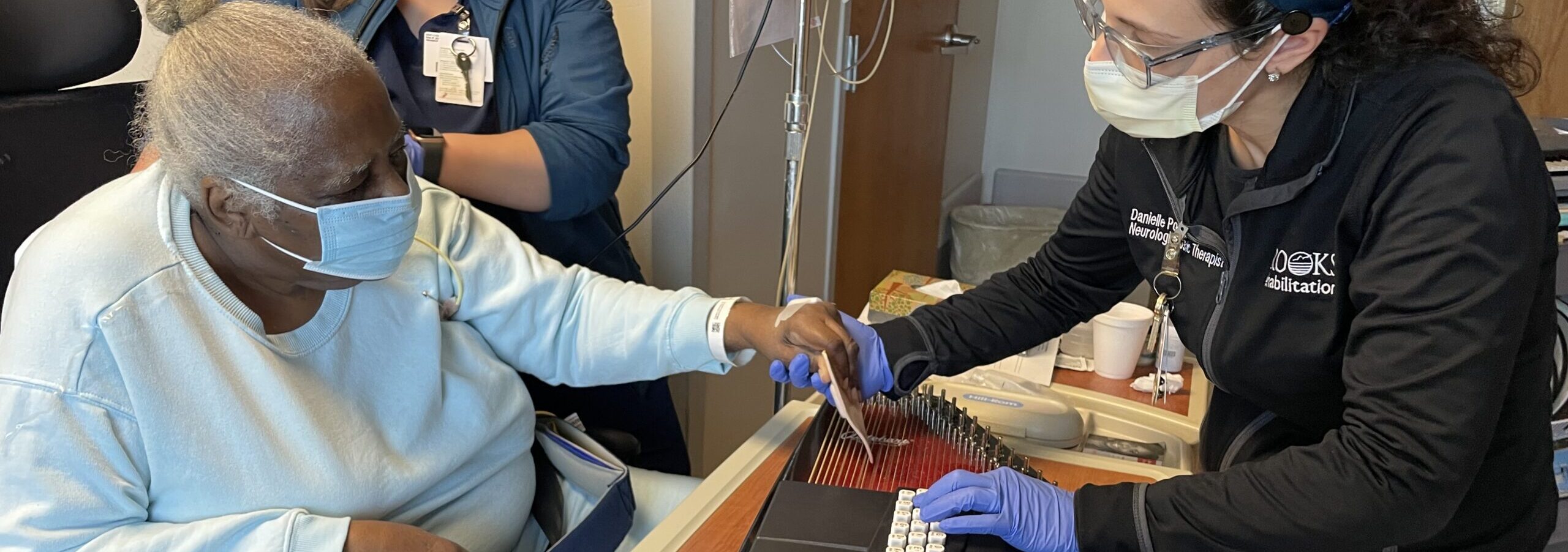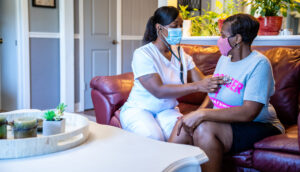March is Music Therapy Month!

Back to physical health resource hub
When asked to envision music therapy, you might picture an outdoor drum-circle or a person teaching a patient how to play a keyboard. In reality, music therapy is much more than what meets the eye – or ear for that matter. Music therapy utilizes evidence-based interventions to address physical, cognitive, communicative, social and emotional goals of individuals with various abilities. Like other health related disciplines, music therapists engage in assessment, treatment planning, documentation and ongoing evaluation. During sessions, patients may interact within a music therapy session by moving with music, playing instruments, singing, songwriting and participating in lyric analysis/discussion.
At Brooks, we utilize neurologic music therapy techniques to improve and retrain brain and behavior function. Some of the outcomes of music therapy include increased verbal expression, respiratory endurance, enhanced memory and attention, improved coordination, affect and participation. Our team of patient-centered therapists strives to treat with compassion through the joys of music. Since we serve multiple locations throughout the Brooks system of care, we treat individuals with varying diagnoses from age 2 to 102. We also co-treat with physical, speech and occupational therapists on a daily basis. This collaboration helps us to continually gain insight and learn best practices from our colleagues to better treat our patients. Additionally, co-treatment often leads to quicker attainment of patient goals and greater outcomes.
One of our favorite aspects of our jobs is getting to see a patient progress as they experience the various offerings across the Brooks system of care. For example, we may initially see a patient in the inpatient hospital setting. Once they discharge, they may attend the Brain Injury Day Treatment program and then the Clubhouse. It is rewarding to see the patient regain their abilities and flourish in each setting. Seeing a patient’s day transform after engaging with their favorite songs never gets old. We are grateful for the unique opportunity to play a small part in their ongoing recovery.
Patient Testimonial
“At first I had no concept of how music would help me recover. I have always enjoyed music, but I had never imagined how music therapy would coincide with my healing. Through our sessions together I found out that it fit like a glove. Our sessions strengthened me, gave me joy and motivated me to keep improving. I could really feel the difference in my endurance and strength throughout our time together by using the instruments and weights. I came into the music therapy sessions with the thought that I would have to be a musician and I had no confidence in myself. However, the confidence I gained from learning to use instruments like piano and drums helped me feel confident throughout all of my therapy sessions at Brooks. Music is always the connection, it stimulates your physical, emotional and spiritual soul. I am so grateful for my time with the music therapists here.”






